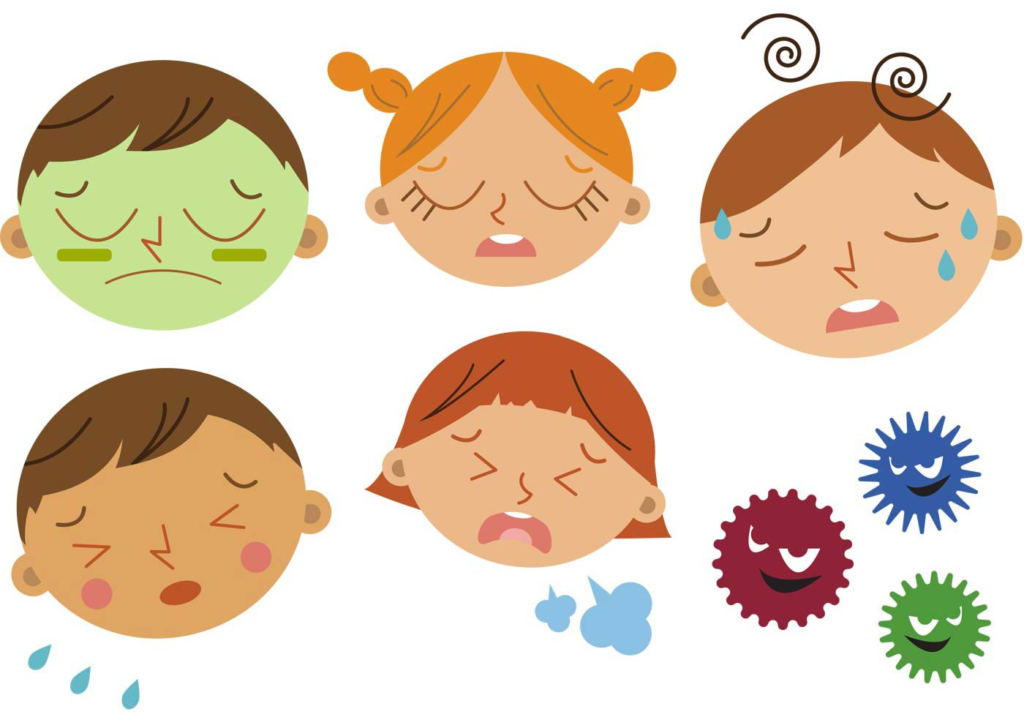
The Common Cold: Your Frequent Visitor
Most toddlers get 6-8 colds each year – that’s totally normal! The American Academy of Pediatrics (AAP) tells us this helps build their immune system.
What You’ll See:
- Runny or stuffy nose
- Cough
- Slight fever
- Fussy mood
- Less appetite
What Helps:
- Lots of rest
- Plenty of fluids
- Cool-mist humidifier
- Nose drops and gentle suction
- Extra cuddles
Call the Doctor If:
- Fever lasts more than 3 days
- Cough keeps them from sleeping
- They won’t drink anything
- Breathing becomes hard or fast
Ear Infections: The Tiny Trouble-Maker
The National Institutes of Health (NIH) says about half of all toddlers will get at least one ear infection before age 2.
What You’ll See:
- Pulling at ears
- Crying more than usual
- Trouble sleeping
- Maybe some fever
- Fluid draining from ears
What Helps:
- Pain relief medicine (ask your doctor which kind)
- Warm compress on the ear
- Lots of rest
- Keeping head raised during sleep
Call the Doctor If:
- Pain lasts more than a day
- High fever shows up
- You see fluid coming from the ears
- Your toddler seems very sick
Stomach Bugs: The Tummy Troubles
The Centers for Disease Control (CDC) says tummy bugs are super common in toddlers.
What You’ll See:
- Throwing up
- Diarrhea
- Tummy pain
- Less appetite
- Tired and cranky
What Helps:
- Small sips of water or ice chips
- Rest
- Bland foods when ready
- Special drinks that replace water and salt in the body
Call the Doctor If:
- No wet diapers for 6 hours
- High fever
- Blood in poop
- Won’t drink anything
- Seems very weak
Hand, Foot, and Mouth Disease: The Spotty Visitor
This common virus usually isn’t serious but can make toddlers feel yucky.
What You’ll See:
- Small red spots on hands, feet, and mouth
- Fever
- Sore throat
- Less appetite
- Fussy mood
What Helps:
- Cold treats like popsicles
- Soft, cool foods
- Pain relief medicine
- Lots of fluids
- Extra rest
Call the Doctor If:
- Your child won’t drink for 8 hours
- Very high fever
- Severe pain
- Spots get infected
When to Get Help Right Away
Call 911 or Go to the ER If Your Toddler:
- Has trouble breathing
- Turns blue or very pale
- Won’t wake up easily
- Has a seizure
- Gets a serious injury
Call Your Doctor If Your Toddler:
- Has a fever over 102°F (39°C)
- Acts very different from normal
- Won’t eat or drink anything
- Shows signs of dehydration
- Has any illness that worries you
Good Things to Know
About Fever
The AAP says not all fevers need medicine. A fever means your child’s body is fighting germs! But always check with your doctor about what’s right for your child.
About Medicines
- Always use medicines made for toddlers
- Keep track of when you give medicine
- Use the measuring tool that comes with the medicine
- Never give adult medicine to toddlers
Tips to Help Prevent Illness
- Wash hands often
- Get all recommended shots
- Serve healthy foods
- Make sure they get enough sleep
- Keep regular doctor check-ups
Remember:
- You know your child best
- Trust your gut feeling
- It’s OK to call the doctor if you’re worried
- Most childhood illnesses pass quickly
- Your toddler is stronger than you think!
Sources:
- American Academy of Pediatrics (AAP)
- Centers for Disease Control and Prevention (CDC)
- National Institutes of Health (NIH)
- World Health Organization (WHO)
Note: This guide gives general information but isn’t medical advice. Always check with your child’s doctor about specific concerns.


